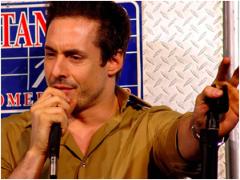

| Interviews |


| Terms | FAQ | Staff | About Us | Contact Us ©2005-2007 STAGE TIME - The Magazine That Stands Up For Comedy. All rights reserved. |
BACK ISSUES INTERVIEWS Stand-Up Comedians Jim Norton Robert Kelly Donnell Rawlings Brad Stine Tammy Pescatelli Leighann Lord George Sarris Nick DiPaolo Russ Meneve Shang and more By Tasha Harris, NYC Comedy Journalist STAGE TIME The Magazine That Stands Up For Comedy |
How has your style changed?
It’s a little bit darker than it was…I think you just accept
it…everything really needs to be talked about. You
realize “I’m just going to say whatever I think.” Once you
get more of the artist view as a comedian, you see that
everything is really fair game.
When is the last time that you bombed was and what did
you learn from it?
I still bomb all the time. The point of trying out new
jokes to try to get better, the more you’re going to
bomb. The best guys really bomb all the time.
It’s a little bit darker than it was…I think you just accept
it…everything really needs to be talked about. You
realize “I’m just going to say whatever I think.” Once you
get more of the artist view as a comedian, you see that
everything is really fair game.
When is the last time that you bombed was and what did
you learn from it?
I still bomb all the time. The point of trying out new
jokes to try to get better, the more you’re going to
bomb. The best guys really bomb all the time.

| Photo: LaMott Jackson |
The more chances you’re taking, the more you’re going to bomb; and the more chances you’re
taking, the more you’re going to get better.
How are you different as a comedian today than you were a year ago?
Certainly, any inhibitions or fears are completely gone. It diminishes to the point where you’re so free
up there. Each passing year, it gets better and better.
What fears did you have?
It’s not that you’re afraid to get onstage, but you’re afraid to go down a path in your mind and not
have the audience go with you. Then slowly, that fear goes away. You don’t care if they go with you or
not…They can like it or not like it, and that’s okay too, but I’m going to say this because I think it’s
funny and it’s going to be a much bigger payoff for me because it’s so unique and different…
It’s going to have a much bigger payoff if it does work, so it’s worth that risk.
How long does it take for a comic to find his voice?
If you want to find it faster, it kind of goes back to what I just talked about. Don’t be afraid to not
have them laughing. Someone asked me about writing and how to go about it and I said to the
person: “It’s the unique thing that something that happened to them or you think about that no
one’s ever talked about, you don’t really know how to phrase it onstage, but you never heard it
before – that’s the one you want to do. It’s that weird thing that you find funny that you never heard
anything like it, that’s the gem that you got to go after.
Do you write onstage or do you set aside time to write?
I write during the day.
Everyday?
Everyday. I get up, I start making coffee. And then I start writing for as long as I can. I save every
bit, joke and idea. A lot of the great jokes that I have now are things that really didn’t work in the
past that I held onto and I was able re-work.
You’ve been on The Tonight Show and Conan. How do you prepare for a TV performance?
Preparing for it, it’s funny because all your jokes are set. They approve them and go over your set.
Nothing really prepares you for a TV spot. I remember when I did my first Conan appearance, it was
my first TV spot and I remember when I first went onstage, the sound was different, the band was
playing and the audience was way back. It was very different medium than what you’re used to. You
get better at it the more you keep doing it…
How did the New York Comedian’s Coalition come about?
I was sitting in my apartment one day and I was thinking about how the pay hadn’t gone up for so
long…We asked an accountant what we would need to get by and he actually calculated that it would
be worth about $100 a day, so we did our best. I basically constructed a letter and we sent it to
everybody outlining the raise and how to go about it constructively. Everyone was really behind it.
taking, the more you’re going to get better.
How are you different as a comedian today than you were a year ago?
Certainly, any inhibitions or fears are completely gone. It diminishes to the point where you’re so free
up there. Each passing year, it gets better and better.
What fears did you have?
It’s not that you’re afraid to get onstage, but you’re afraid to go down a path in your mind and not
have the audience go with you. Then slowly, that fear goes away. You don’t care if they go with you or
not…They can like it or not like it, and that’s okay too, but I’m going to say this because I think it’s
funny and it’s going to be a much bigger payoff for me because it’s so unique and different…
It’s going to have a much bigger payoff if it does work, so it’s worth that risk.
How long does it take for a comic to find his voice?
If you want to find it faster, it kind of goes back to what I just talked about. Don’t be afraid to not
have them laughing. Someone asked me about writing and how to go about it and I said to the
person: “It’s the unique thing that something that happened to them or you think about that no
one’s ever talked about, you don’t really know how to phrase it onstage, but you never heard it
before – that’s the one you want to do. It’s that weird thing that you find funny that you never heard
anything like it, that’s the gem that you got to go after.
Do you write onstage or do you set aside time to write?
I write during the day.
Everyday?
Everyday. I get up, I start making coffee. And then I start writing for as long as I can. I save every
bit, joke and idea. A lot of the great jokes that I have now are things that really didn’t work in the
past that I held onto and I was able re-work.
You’ve been on The Tonight Show and Conan. How do you prepare for a TV performance?
Preparing for it, it’s funny because all your jokes are set. They approve them and go over your set.
Nothing really prepares you for a TV spot. I remember when I did my first Conan appearance, it was
my first TV spot and I remember when I first went onstage, the sound was different, the band was
playing and the audience was way back. It was very different medium than what you’re used to. You
get better at it the more you keep doing it…
How did the New York Comedian’s Coalition come about?
I was sitting in my apartment one day and I was thinking about how the pay hadn’t gone up for so
long…We asked an accountant what we would need to get by and he actually calculated that it would
be worth about $100 a day, so we did our best. I basically constructed a letter and we sent it to
everybody outlining the raise and how to go about it constructively. Everyone was really behind it.